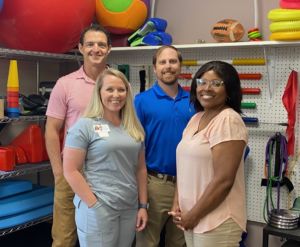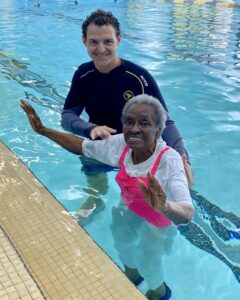


Rehabilitation Therapy
Memorial Hospital and Manor’s Comprehensive Rehabilitation Services are provided to individuals of all age groups who demonstrate functional limitations that interfere with their ability to perform their normal activities of daily living. The Rehab Department also offers preventative training to industry, schools and the general public in order to promote health and wellness within our community. The Outpatient Rehab Department is located at Memorial Medical Center, 603 Wheat Avenue, in Bainbridge, Georgia. Patients with a physician order may schedule appointments by calling (229) 243-8124. Licensed Physical Therapists, Occupational Therapists, and Speech Pathologists, lead a team of Licensed Assistants in offering the following services:
- Physical Therapy
- Occupational Therapy
- Speech / Language Pathology
Rehab Services are provided in various settings, including:
- Inpatient
- Swingbed
- Outpatient
- Pool / Aquatics
- Nursing Home
Who Benefits From Physical Therapy?
Anyone who is dealing with physical disabilities resulting in pain, decreased range of motion, decreased strength, or impaired ability to perform gross motor skills (transfer from one position to another, stand, walk, etc.) would benefit from physical therapy services. Physical Therapy also plays an active role in wound care management (inpatient and outpatient). Examples of patients treated by a Physical Therapist are:
- patients with arm or leg injuries
- patients who suffer from chronic conditions such as arthritis.
- pediatric patients with birth injuries or developmental delay in gross motor skills
- geriatric patients with functional limitations following a stroke, heart attack, burn, amputation or generalized deconditioning
- an athlete with sprain, strain or fracture
- a patient with work-related, repetitive-stress injury such as tendonitis or bursitis
- a patient with spinal cord injuries
- an orthopedic patient who has undergone surgical repair of arm, leg or spine
- patients with open wounds
- patients with neurological conditions or history of stroke.
- patients with loss of balance or difficulty walking
Who Benefits From Occupational Therapy?
Anyone who needs treatment to facilitate independence in any aspect of their lives would benefit from occupational therapy (OT) services. OT gives people “the skills for the job of living” and focuses on restoration of range of joint motion, muscle strength, fine motor training, ADL training, and recommendations for job/home site modifications and adaptive equipment. Examples of patients who benefit from Occupational Therapy are:
- patients with arm/hand injuries
- patients who suffer from chronic conditions such as arthritis or MS
- pediatric patients with birth injuries, learning problems or developmental delays
- geriatric patients with functional limitations following a stroke, heart attack, burn, or amputation
- athletes with broken bones or other injuries from various types of accidents
- patients with cognitive problems that threaten their ability to drive
- patients with work-related, repetitive-stress injuries
- patients with spinal cord injuries
- orthopedic patients who have undergone surgical repair of upper extremity dysfunction (tendon repair of hand, rotator cuff repair, total joint replacement)
Who Benefits From Speech Therapy?
Patients who have been diagnosed with a speech-language dysfunction or a swallowing disorder would benefit from speech/language pathology services. Examples of patients who might benefit from Speech/Language Pathology are:
- patients with slurred speech following a stroke
- geriatric patients with loss of swallowing ability
- pediatric patients with delayed language development
- patients with impaired memory and thinking skills after a stroke
- patients who are unable to form words after a traumatic brain injury
- Parkinson’s patients who cough frequently with eating or drinking
Why would I do aquatic therapy instead of normal clinic based therapy out of pool?
There are many benefits to aquatic therapy in the pool that are simply not available out of the pool. The improved buoyancy in water decreases loading on joints. We you are standing in water up to your neck your body weight is only 10% of your actual body weight. This allows for improved control of posture and weak muscles have improved ability to control joints and strengthen with correct form. Core stabilization activities can be performed in deeper water with a floatation device which allows for a traction force, unloading your spine, to decrease pain while allowing to strengthen your core. Our Aquatic Therapy sessions are held at the YMCA here in town. You can do aquatic therapy even if you can not swim. Many of our aquatic patients can’t swim or are not comfortable in the water when they begin therapy. We will not put you in a situation that is unsafe. A therapist and lifeguard are present during your sessions and the vast majority of our patients do not even get their hair wet.
